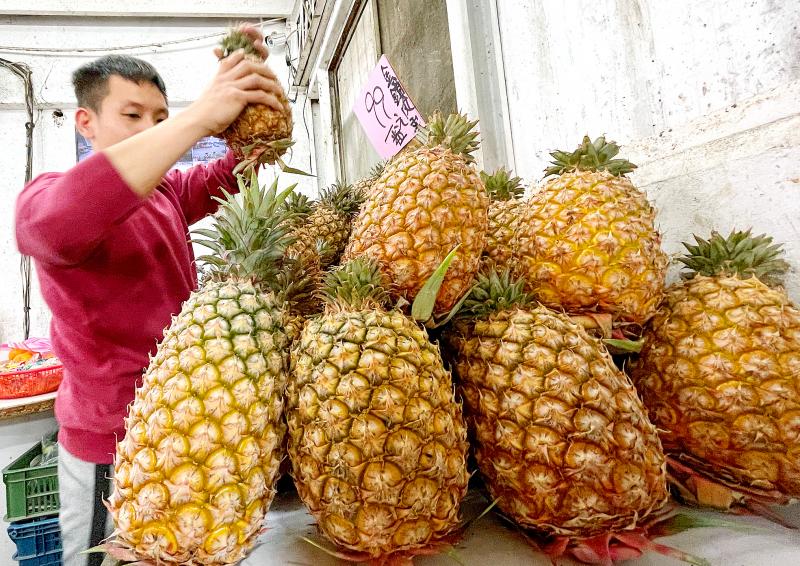More than 99 percent of pineapples sold to China passed inspections, the government said yesterday, after China earlier in the day abruptly suspended imports of pineapples from the nation, which Taipei called an “unfriendly” move.
From Monday, China is to stop importing pineapples from Taiwan, the Chinese General Administration of Customs said.
The regulation is a normal measure for ensuring biosafety, China’s Taiwan Affairs Office spokesman Ma Xiaoguang (馬曉光) said in a news release later yesterday.

Photo: Liu Hsin-de, Taipei Times
Since last year, Chinese customs officials have repeatedly seized pineapples imported from Taiwan that carried “perilous organisms,” Ma said.
Were the organisms to spread in China, they would pose a serious threat to agricultural and ecological safety, he said.
The import ban is scientifically rational and complies with Chinese law, he said.
Presidential Office spokesman Xavier Chang (張惇涵) said in a statement that since last year, 99.79 percent of Taiwan’s pineapples sold to China passed testing at customs.
China’s action is “unfriendly,” Chang said.
The Council of Agriculture (COA) announced that it would spend NT$1 billion (US$35.33 million) to promote pineapple sales at home and abroad, while President Tsai Ing-wen (蔡英文) and Vice President William Lai (賴清德) would take action to support domestic growers by consuming more pineapples themselves, Chang said.
Farmers can rest assured that the government would do its utmost to help them, he said, adding that hopefully, Taiwanese would support the local pineapple industry, just like Australians supported their country’s wine industry after China imposed high tariffs on those products.
COA Minister Chen Chi-chung (陳吉仲) said that the council had received China’s “unilateral notice” on Thursday evening, without any warning.
It attempted to express its concern to its counterpart in China, but the Chinese contact did not answer a telephone call, Chen said.
Taiwan produces nearly 420,000 tonnes of pineapples every year, and has exported 6,200 batches to China since last year, with only 13 batches, totaling 141 tonnes, failing tests, meaning the qualification rate was 99.79 percent, he said.
In “normal” international trade practices, this qualification rate is top-notch, while the few pineapples that did not pass were approved after fumigation, Chen said.
Beijing probably imposed the sanction because Taiwan’s pineapple production season is about to start, which would go against normal international trade practice, he said.
Data from the council showed that plantations in Pingtung County produce 30 percent of the nation’s pineapples, followed by Kaohsiung and Tainan (14 percent each), Chiayi County (13 percent), Nantou County (12 percent) and Hualien and Taitung counties (percentages uncertain).
Pineapple exports to all nations totaled 31,927 tonnes in 2018 and 51,476 tonnes in 2019, the data showed.
China accounted for 97 percent of exported pineapples, followed by Japan (2 percent) and Hong Kong (1 percent), the data showed.
For all produce, exports to China last year made up 20.7 percent, totaling more than US$1 billion, followed by Japan (15.5 percent) and the US (13.7 percent), the data showed.
Additional reporting by Wen Chun-hua

AIR SUPPORT: The Ministry of National Defense thanked the US for the delivery, adding that it was an indicator of the White House’s commitment to the Taiwan Relations Act Deputy Minister of National Defense Po Horng-huei (柏鴻輝) and Representative to the US Alexander Yui on Friday attended a delivery ceremony for the first of Taiwan’s long-awaited 66 F-16C/D Block 70 jets at a Lockheed Martin Corp factory in Greenville, South Carolina. “We are so proud to be the global home of the F-16 and to support Taiwan’s air defense capabilities,” US Representative William Timmons wrote on X, alongside a photograph of Taiwanese and US officials at the event. The F-16C/D Block 70 jets Taiwan ordered have the same capabilities as aircraft that had been upgraded to F-16Vs. The batch of Lockheed Martin

GRIDLOCK: The National Fire Agency’s Special Search and Rescue team is on standby to travel to the countries to help out with the rescue effort A powerful earthquake rocked Myanmar and neighboring Thailand yesterday, killing at least three people in Bangkok and burying dozens when a high-rise building under construction collapsed. Footage shared on social media from Myanmar’s second-largest city showed widespread destruction, raising fears that many were trapped under the rubble or killed. The magnitude 7.7 earthquake, with an epicenter near Mandalay in Myanmar, struck at midday and was followed by a strong magnitude 6.4 aftershock. The extent of death, injury and destruction — especially in Myanmar, which is embroiled in a civil war and where information is tightly controlled at the best of times —

China's military today said it began joint army, navy and rocket force exercises around Taiwan to "serve as a stern warning and powerful deterrent against Taiwanese independence," calling President William Lai (賴清德) a "parasite." The exercises come after Lai called Beijing a "foreign hostile force" last month. More than 10 Chinese military ships approached close to Taiwan's 24 nautical mile (44.4km) contiguous zone this morning and Taiwan sent its own warships to respond, two senior Taiwanese officials said. Taiwan has not yet detected any live fire by the Chinese military so far, one of the officials said. The drills took place after US Secretary

THUGGISH BEHAVIOR: Encouraging people to report independence supporters is another intimidation tactic that threatens cross-strait peace, the state department said China setting up an online system for reporting “Taiwanese independence” advocates is an “irresponsible and reprehensible” act, a US government spokesperson said on Friday. “China’s call for private individuals to report on alleged ‘persecution or suppression’ by supposed ‘Taiwan independence henchmen and accomplices’ is irresponsible and reprehensible,” an unnamed US Department of State spokesperson told the Central News Agency in an e-mail. The move is part of Beijing’s “intimidation campaign” against Taiwan and its supporters, and is “threatening free speech around the world, destabilizing the Indo-Pacific region, and deliberately eroding the cross-strait status quo,” the spokesperson said. The Chinese Communist Party’s “threats